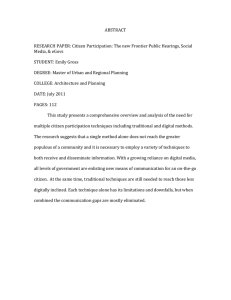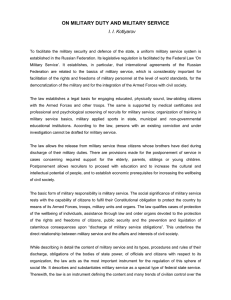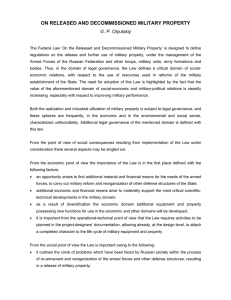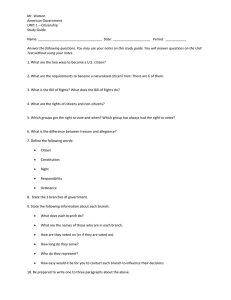THE FEDERAL LAW ON MILITARY DUTY SERVICE Theo Van Den Doel
advertisement
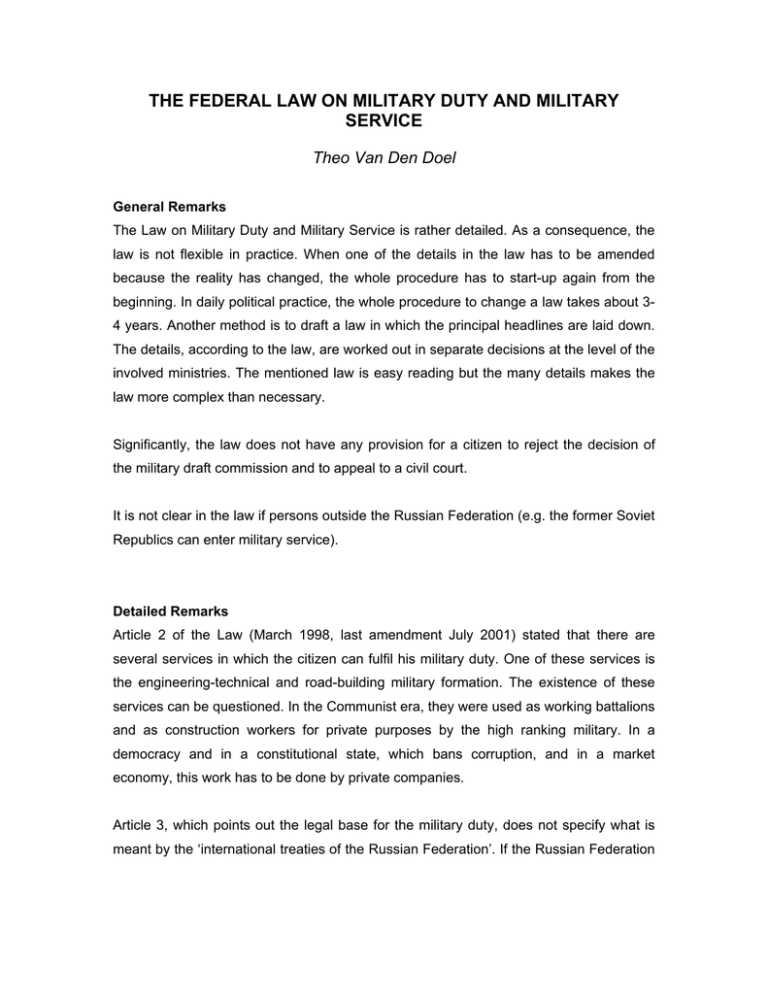
THE FEDERAL LAW ON MILITARY DUTY AND MILITARY SERVICE Theo Van Den Doel General Remarks The Law on Military Duty and Military Service is rather detailed. As a consequence, the law is not flexible in practice. When one of the details in the law has to be amended because the reality has changed, the whole procedure has to start-up again from the beginning. In daily political practice, the whole procedure to change a law takes about 34 years. Another method is to draft a law in which the principal headlines are laid down. The details, according to the law, are worked out in separate decisions at the level of the involved ministries. The mentioned law is easy reading but the many details makes the law more complex than necessary. Significantly, the law does not have any provision for a citizen to reject the decision of the military draft commission and to appeal to a civil court. It is not clear in the law if persons outside the Russian Federation (e.g. the former Soviet Republics can enter military service). Detailed Remarks Article 2 of the Law (March 1998, last amendment July 2001) stated that there are several services in which the citizen can fulfil his military duty. One of these services is the engineering-technical and road-building military formation. The existence of these services can be questioned. In the Communist era, they were used as working battalions and as construction workers for private purposes by the high ranking military. In a democracy and in a constitutional state, which bans corruption, and in a market economy, this work has to be done by private companies. Article 3, which points out the legal base for the military duty, does not specify what is meant by the ‘international treaties of the Russian Federation’. If the Russian Federation has obliged itself in international treaties to contribute with armed forces (e.g. the GOS treaty) it is recommended [that the specific obligations are pointed out]. Article 13 points out the education prior to the military service. At the age of 16, citizens have to follow courses to achieve a kind of minimum level for the military service. It is not clear what the consequences are if this has been refused. (e.g. by the parents) In Article 14, there is preferential treatment (choice of military school, military unit etc.) for those who have followed the ‘military patriotic youth’ education. This preference can be questioned in a free and open democracy in which citizens make their own choices. Article 17 is rather vague in terms of age and period. For how long can citizens obtain such voluntary training? The article does not mention either the obligations of the State or the obligations of the citizen. Article 23 (1d) releases a citizen from military draft in the event that he has fulfilled his military service in another State. It is not clear neither what the range is of this subarticle, nor what the status is if the citizen comes from a state which has only a voluntary army. There is an overlap in the Articles 16 and 30. Most preferable is that in Article 30 a reference is made to Article 16. Article 38 (Para 2) regulates the time-compensation available for a conscript who performs their duty during battle operations or during an armed conflict. The article does not make clear what the terms are for a battle operation. It is not clear for example if UNpeacekeeping missions meet the requirements of this article. Article 43 regulates the appointments to and release from military positions. These activities are regulated by Presidential Decrees. It is understandable that the President as the Supreme Commander in Chief of the Armed Forces appoints and releases highranking officers: but it is not clear in the law which military ranks belong to the category of high-ranking officers. Article 45 describes the position of military personnel who are elected in the Duma or in the Federation Council. After their termination as politician, they either return back to the armed forces or are discharged from military service. It is not clear on what kind of criteria the two different decisions are based.


